A long-term solution that completely eradicates the slime that is a bi-product of tuna farming is possible, the Secretary of the Federation of Maltese Aquaculture Producers (FMAP) John Refalo told The Malta Independent on Thursday.
Till this solution is found however, Refalo said that it could not be guaranteed that other isolated incidents of slime making its way to the shoreline will not occur.
Refalo said that within the coming years, the aim of the FMAP and its members was to adopt certain measures so that the infamous slime that has caused so much controversy in recent years would not only be eradicated from the open sea, but also from being produced in the first place.
Asked by this newsroom on how the slime could be eradicated, Refalo said that there were numerous factors that play a part in this situation, citing the type of food that is given to the fish and the way that it is processed as just some of those factors.
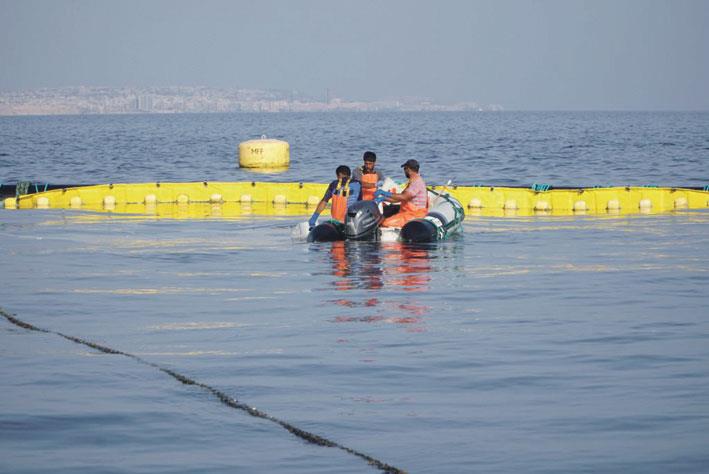
Photos James Caruana
The first step to engaging in this process of eradication was the drawing up of a pilot agreement, mediated by the FMAP and signed by four out of the five tuna farm operators that work in Maltese waters. The aim of this agreement was to ensure that incidents wherein fish farm slime ends up on the shoreline are stopped, and included measures such as the mandatory placement of booms around each cage to contain any oils that emerge from the feed used for the fish; that there are boats dedicated to picking up any waste from the cages and that each operator has two vessels patrolling the coast to pick up any waste that may be reported in the sea, even waste which does not emerge from fish farms.
The agreement came into being on 1 August after several complaints of sea slime across a number of beaches were reported. It runs until the end of October, by which point the feeding period for the tuna would have ended and the harvest season would have begun.
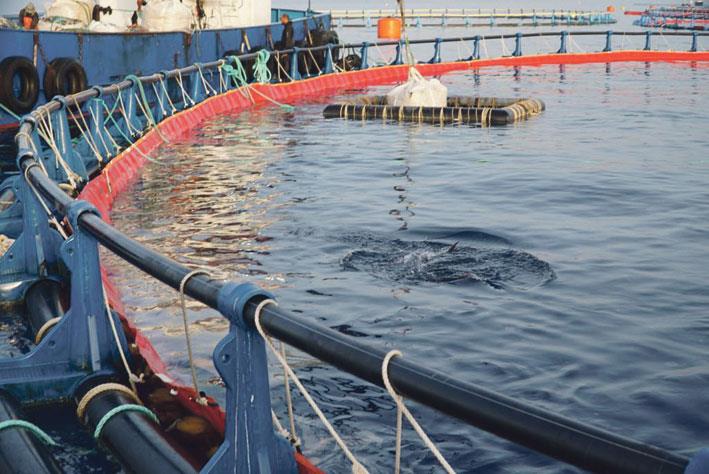
A visit to the site showed early on Thursday morning showed tuna farm workers directing sea slime which was confined in each respective cage into a skimmer, which is a device on a nearby boat that collects the oil and removes it from the water. Speaking to journalists, the operators explained that the oil is then separated from the water before it is exported to Italy for refinement. The export is in fact omega oil, and is used widely in the production of medicine.
Furthermore, the operators explained, fish farms are also refraining from feeding fish during stormy weather, out of fear that the slime that is produced directly after feeding is forced out of the confinement of the booms due to rough winds and currents.
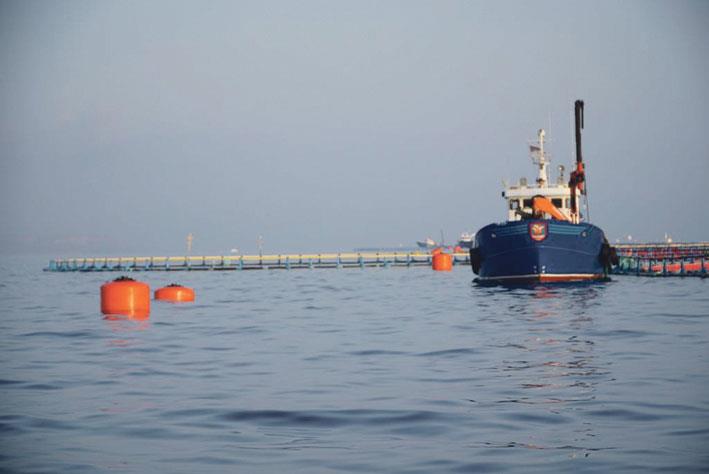
Pilot agreement between FMAP and fish farm operators will become permanent
“There is no question” that the pilot agreement that was signed by the four fish farm operators and the FPMA in August will become permanent, Refalo told The Malta Independent.
He explained that the agreement had resulted in so many positive changes that, even though it was initially a pilot one for the current season, it was certain that it would be built upon and made permanent.
The operators which have signed on to this agreement are AJD Tuna Limited, Fish and Fish Limited, Malta Mariculture Limited and MFF Limited. Mare Blue Tuna Farm Limited, a subsidiary of a Spanish company, are the only operators who are yet to conform to this agreement. Mare Blue have the highest share of tuna farm out of all the operators; their harvests make up 40% of the total amount of tuna to come out of Maltese waters.
When asked by this newsroom why Mare Blue was as of yet not a signatory to this agreement Refalo was coy in his response, saying that such a question has to be asked to the operator themselves. However, he said that if Mare Blue wishes to join the federation in this agreement and hold itself to the standards that the FMPA has set then it is more than welcome to become a member within the federation.
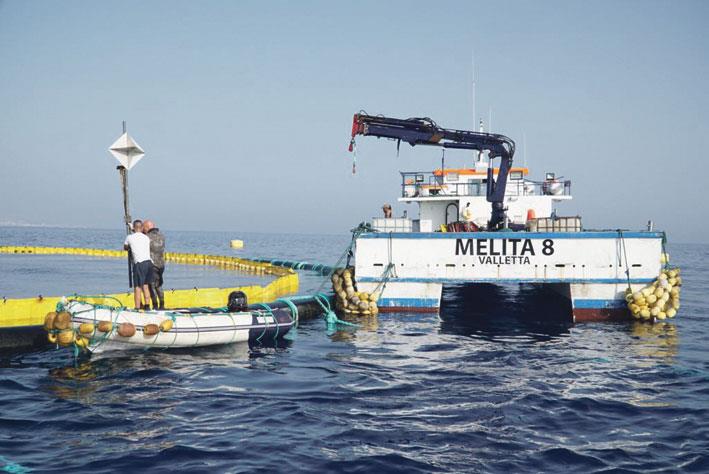
The sea slime issue has been one that emerged some years ago. In 2017, operators were ordered to move their tuna farms further offshore to the sites that they currently operate, which is six kilometres away from the coast. However following numerous reports of sea slime this summer, it became clear that this measure alone was not enough to mitigate the situation. As a result an agreement between the operators was drawn up to cater for the 2018 season. This was the first time that such an agreement was reached between operators ever since the sea slime problem became more widespread in 2016.
Asked by The Malta Independent whether in coming up with this agreement this season after reports of sea slime were once again widespread and not before the problem, the federation and its members were acting in a reactive manner more than in a proactive one, Refalo said that the agreement had been in discussion “for a number of months” and that it wasn’t simply a “spur of the moment” decision.
He continued by saying that the agreement is not a complete solution to the problem, but it is a step in the right direction. He pointed out that ever since the agreement was reached, there had been a drastic reduction in incidents; so much so that the instances of fish farm slime being reported were very isolated.
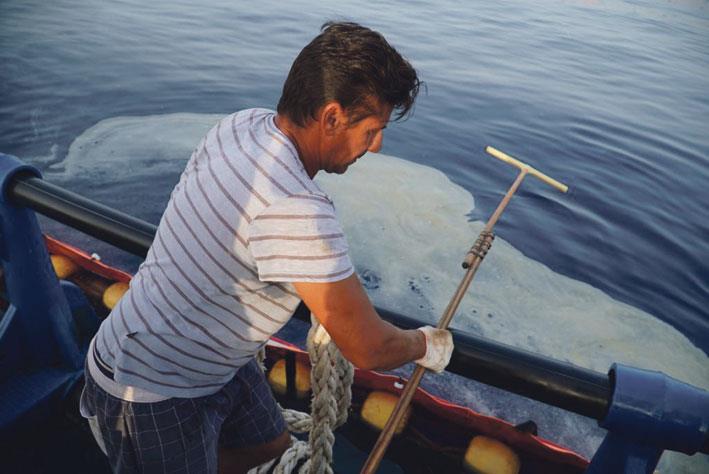
Refalo said that the federation was studying several means and measures that could be employed to further reduce the output of oils, but also reminded that the oils that constitute the slime are products themselves, as they can be refined for use in the production of medicines.
He also noted that they receive a lot of the complaints on their helpline, which was also set up as part of the pilot agreement, of alleged sea slime that were in actual fact not slime. Refalo explained that the sea is an area of life, and that certain instances of bubbling or foam that are in fact produced naturally from the sea, possibly through organisms or algae. He said that there could be other instances where in fact the substance had come from detergents drained from beach showers, or even sewage leaking into the sea.
Refalo concluded that the sea is a small place and that whilst it is there to be enjoyed, it is also a source of income for others. He said that there must be an element of co-existence, and affirmed that the federation is committed to reaching this ideal state of co-existence where the fish farm operations do not affect how others use the sea.